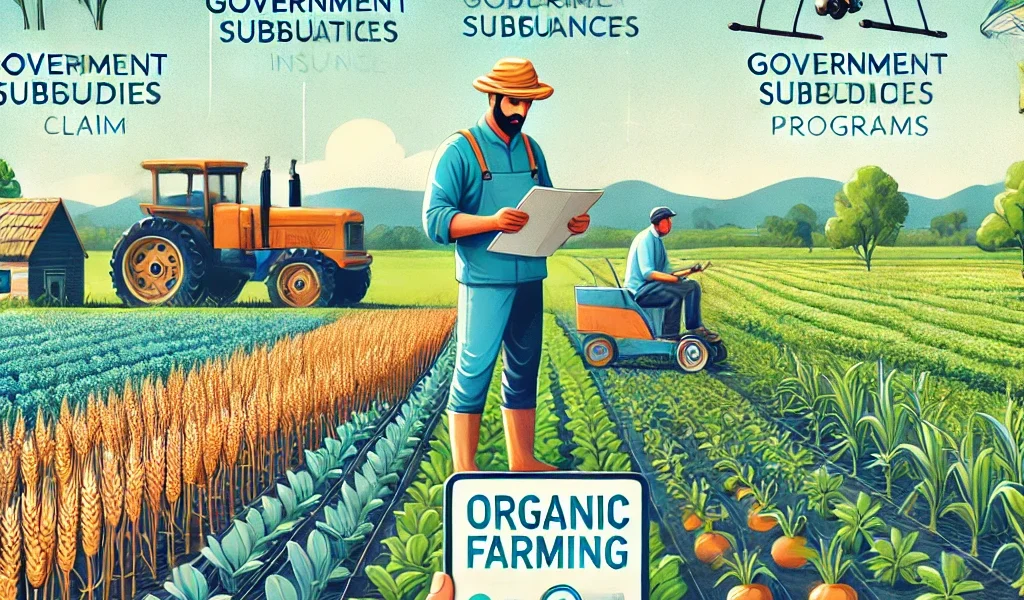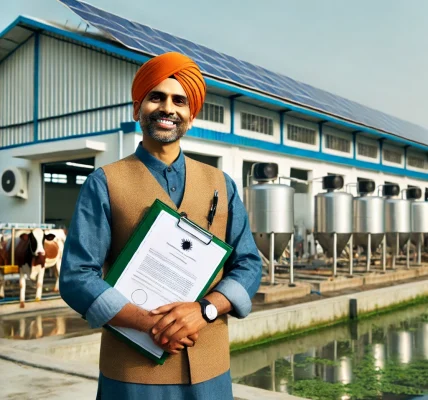New Subsidy Programs for Organic Farming: A Complete Guide (Under Insurance Claims)
Introduction
Organic farming is gaining momentum in India as consumers demand healthier, chemical-free produce. The government is actively promoting organic agriculture through subsidy programs and insurance schemes to support farmers in transitioning to sustainable practices. These initiatives help mitigate risks associated with crop failure, market instability, and high production costs.
In this comprehensive guide, we will explore the latest government subsidy programs for organic farming under insurance claims, ensuring that farmers get the financial protection they deserve.
Understanding the Need for Subsidy Programs in Organic Farming
Farmers transitioning to organic farming often face several challenges:
- High Initial Costs: Organic fertilizers, bio-pesticides, and certification expenses are significant.
- Yield Uncertainty: Organic crops might take time to adapt, leading to lower initial yields.
- Market Competition: Conventional produce often dominates the market, making it harder for organic farmers to compete.
- Climate Risks: Natural disasters, pest infestations, and erratic weather conditions can severely impact organic farming.
To address these issues, the government provides financial support through various subsidy and insurance programs that cover input costs, certification, and risk protection.
Key Government Subsidy Programs for Organic Farming
1. Paramparagat Krishi Vikas Yojana (PKVY)
PKVY is a flagship program promoting organic farming through financial assistance.
- Subsidy Amount: Up to ₹50,000 per farmer over three years.
- Coverage:
- Organic input costs (bio-fertilizers, bio-pesticides, compost, etc.).
- Organic certification expenses.
- Training and marketing support.
- Insurance Benefit: Crop losses due to natural disasters are covered under Pradhan Mantri Fasal Bima Yojana (PMFBY).
2. Mission Organic Value Chain Development for North Eastern Region (MOVCDNER)
Designed specifically for farmers in the Northeast, this program promotes organic farming by providing:
- Financial Support: Up to ₹10,000 per acre for organic inputs.
- Market Linkage: Assists farmers in finding buyers for their organic produce.
- Insurance Integration: Losses due to weather or pest attacks are covered under government-backed insurance schemes.
3. National Mission for Sustainable Agriculture (NMSA)
NMSA supports sustainable agricultural practices, including organic farming, through:
- Subsidized Organic Inputs: Financial aid for organic fertilizers, vermicompost units, and bio-pesticides.
- Risk Mitigation: Farmers can avail crop insurance under PMFBY, ensuring protection against losses.
4. Rashtriya Krishi Vikas Yojana (RKVY)
RKVY provides financial assistance to encourage organic farming through:
- Subsidies on Farm Infrastructure: Cold storage, compost pits, and bio-fertilizer plants.
- Marketing Support: Helps farmers sell their organic produce at premium rates.
- Insurance Claims Support: Covers yield losses due to extreme weather conditions.
5. State-Specific Organic Farming Schemes
Several Indian states offer additional support for organic farmers:
- Sikkim Organic Mission: 100% financial support for organic certification and inputs.
- Tamil Nadu Organic Farming Policy: Direct subsidies for organic fertilizers and training.
- Madhya Pradesh Organic Mission: Subsidies for organic seed banks and certification.
Farmers should check their respective state agricultural departments for more details.
How Organic Farmers Can Benefit from Insurance Claims
Farmers engaged in organic farming are eligible for insurance coverage under government schemes like PMFBY. Here’s how they can benefit:
1. Coverage Against Crop Losses
- Natural Disasters: Compensation for losses due to drought, floods, cyclones, and extreme weather events.
- Pest and Disease Outbreaks: Protection against unexpected infestations affecting organic crops.
2. Reduced Financial Risk
- Subsidies and insurance together reduce the overall financial burden on farmers.
- Compensation ensures that farmers can reinvest in their next organic farming cycle without heavy losses.
3. Simplified Claim Process
- Farmers can report losses through mobile applications like the PMFBY App.
- Satellite and drone-based assessments make claims processing faster and more accurate.
- Direct Benefit Transfer (DBT) ensures claims are credited directly to the farmer’s bank account.
Step-by-Step Guide to Avail Organic Farming Subsidies & Insurance Claims
Step 1: Register for a Subsidy Program
- Visit your nearest Agriculture Department Office or Common Service Center (CSC).
- Submit required documents like land records, Aadhar card, and bank account details.
- Enroll in a recognized organic certification program to qualify for benefits.
Step 2: Apply for Insurance Coverage
- Choose a government-backed insurance plan (PMFBY is recommended).
- Register through the PMFBY online portal or authorized insurance agents.
- Pay the minimal premium required for coverage.
Step 3: Report Crop Losses for Insurance Claims
- In case of crop damage, report the incident within 72 hours via:
- PMFBY mobile app.
- Local agriculture officer.
- Designated insurance representative.
- Government authorities will assess losses through technology-driven surveys.
Step 4: Receive Financial Assistance
- Approved claims will be transferred to the registered bank account under DBT.
- Subsidies will be disbursed as per the scheme’s guidelines.
Challenges & Solutions in Availing Organic Farming Subsidies & Insurance
Challenges:
- Lack of Awareness: Many farmers are unaware of subsidy programs and insurance benefits.
- Complex Documentation: Lengthy paperwork can delay subsidy and claim approvals.
- Delayed Compensation: Insurance claims processing sometimes takes longer than expected.
Proposed Solutions:
- Government Outreach Programs: More awareness campaigns through TV, radio, and village meetings.
- Digitized Applications: Encouraging online registration for faster approvals.
- Faster Claim Settlements: Using AI-based crop damage assessment for quicker payouts.
Conclusion
Government subsidy programs and insurance schemes are transforming organic farming in India, making it more financially sustainable and less risky. Programs like PKVY, MOVCDNER, and NMSA offer significant financial support, while insurance schemes like PMFBY ensure that farmers recover from unexpected losses.
By leveraging these initiatives, farmers can reduce production costs, minimize risks, and enhance profitability in organic farming. However, continuous efforts in spreading awareness and simplifying processes are essential to maximize the benefits for farmers across India.




